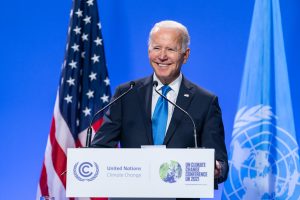President Joe Biden will host the leaders of the Association of Southeast Asian Nations (ASEAN) – most likely minus Myanmar – at a special summit in Washington, D.C. later this month, the White House announced yesterday.
In a statement, White House press secretary Jen Psaki announced that the previously announced summit had been scheduled for March 28-29, and is viewed by Biden’s team as a way of demonstrating the U.S. commitment to the bloc on the 45th anniversary of U.S.-ASEAN relations.
“It is a top priority for the Biden-Harris Administration to serve as a strong, reliable partner and to strengthen an empowered and unified ASEAN to address the challenges of our time,” Psaki said.
The confirmation of the summit marks an important milestone in the Biden administration’s attempts to engage Southeast Asia, a region that it views as central to countering China’s rising influence in Asia.
After a slow start in the early months of the Biden administration, since mid-2021 the U.S. has dispatched a number of senior officials on regional tours, including Vice President Kamala Harris, Defense Secretary Lloyd Austin, Wendy Sherman, the deputy secretary of state, and Daniel Kritenbrink, the State Department’s top diplomat for East Asia and the Pacific. The most recent of these came in December, when Secretary of State Antony Blinken visited Malaysia, Thailand, and Indonesia, during which he described ASEAN as “essential to the architecture of the Indo-Pacific region.”
The invitation is unlikely to extend to Myanmar’s military junta, which overthrew the country’s elected government in February 2021 and has spent the past year trying vainly, and with considerable violence, to consolidate its coup. ASEAN barred the military administration from its the last major summit in October and in last month’s ASEAN Foreign Ministers’ Retreat, due to its lack of cooperation on the implementation of the bloc’s Five-Point Consensus peace plan. (On both occasions, instead of sending a “non-political” representative the junta chose not to attend.)
The Associated Press, citing a Biden administration official who was not authorized to comment publicly, confirmed that the “ASEAN-9” formula is expected to remain in place for the special summit, which only makes sense when one considers the optics of a junta official being feted in Washington.
The summit is likely to be welcomed by most Southeast Asian governments, who for all their misgivings about certain aspects of U.S. policy, want Washington to remain engaged in the region. Latest survey of regional opinion by Singapore’s ISEAS-Yusof Ishak Institute showed that 52.8 percent of correspondents had confidence in the U.S. to “do the right thing” to contribute to global peace, security, prosperity and governance, compared to just 26.8 percent for China.
The sticking point is that the U.S. rhetoric about the centrality of Southeast Asia to its Indo-Pacific strategy has often not been matched by its actions. In particular, the lack of a clear trade and economic agenda for the region in the wake of President Donald Trump’s withdrawal from the Trans-Pacific Partnership has created the impression that U.S. policy is focused more on pointing out the negatives of closer partnership with China than demonstrating the benefits of closer partnership with the United States.
The U.S. has promised to fill in this economic vacuum with a new Indo-Pacific economic framework that will focus on trade, the digital economy, technology, supply chains, and clean energy (among other things), something that will perhaps be revealed during or prior to the Washington summit. But until the specifics become clear, the question will continue to hang over U.S. policy toward the region.
The Biden administration’s engagement with Southeast Asia has only partly lived up to what many in the region might have hoped, which is perhaps understandable given the crises that it has faced in Afghanistan and Ukraine, to say nothing of the exigencies of the COVID-19 pandemic. The summit will provide an opportunity to lay out a more proactive and positive vision of U.S. engagement with Southeast Asia in an era of increasing superpower polarization.













